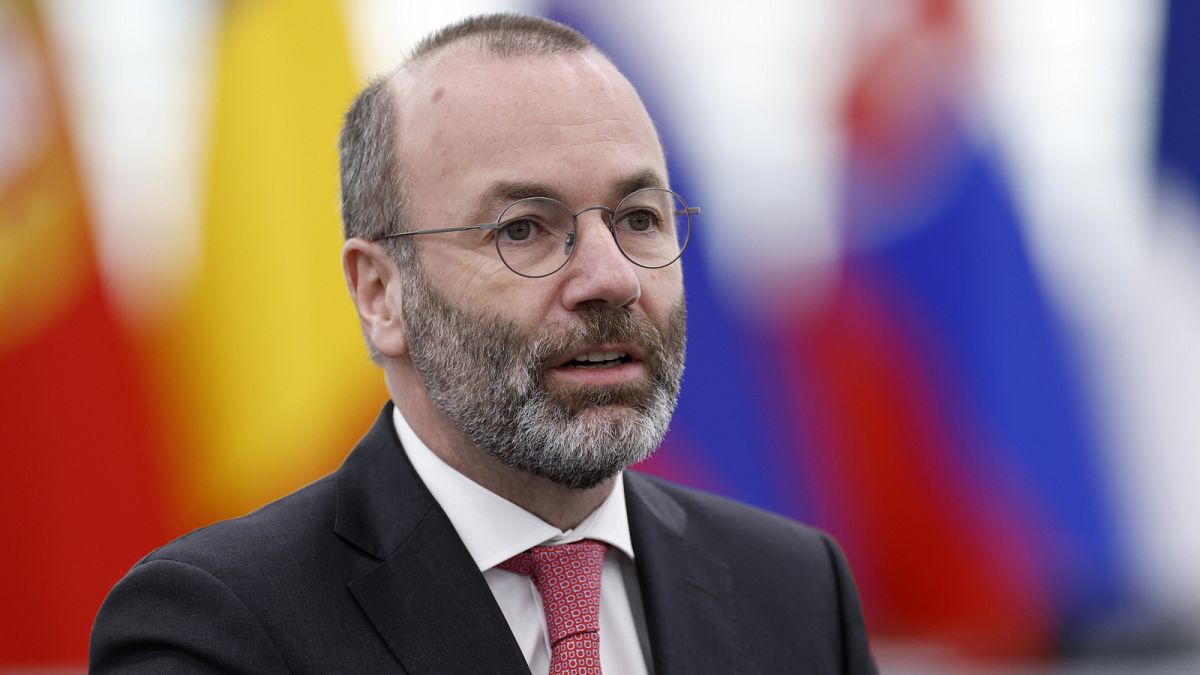The EU must work with Tunisia to bring the number of illegal migrants down while respecting their right to human dignity, the leader of the centre-right European People’s Party (EPP), Manfred Weber, told Euronews.
“Our approach is clear. We have to respect human rights. We have to respect the human dignity of every migrant. But on the other hand, we have to fight against illegal migration,” Weber said Friday in an interview, days after he visited Tunisia to discuss migration issues with President Saied and the country’s foreign and home affairs ministers.
In July, the EU struck a controversial deal worth over €700 million with Tunisia to prop up the country's economy and curb irregular migration into Europe.
Of that envelope, €105 million will fund migration control measures such as anti-smuggling operations, border management and the return of asylum seekers. Tunisia is a departure point for thousands of migrants crossing the Mediterranean into Europe, and the deal could be used as an EU template for agreements with other North African countries.
But the arrangement has been blasted by members of the European Parliament (MEPs) for failing to recognise mounting evidence of Tunisian authorities’ abusive treatment of sub-Saharan migrants, including illegal pushbacks, racial hatred and human rights violations.
In early August, 27 migrants were found dead in Libyan territory near the Tunisian border, days after Interior Minister Kamel Fekih admitted small groups of migrants were being pushed back into the desert region bordering Libya and Algeria.
President Saied has also previously embraced far-right conspiracies that migrants are plotting to change the country’s demographic make-up.
Humanitarian, but strict
When asked about the questionable human rights record of the Tunisian authorities, Weber said that "European migration policy is always built on humanitarian spirit to respect the individual people behind. But on the other hand, to have strict control about the borders."
Weber, who in 2017 criticised former US President Donald Trump for building a fence wall at the US border with Mexico, now suggests Europe needs such mechanisms to protect its borders.
"For me, it's clear we have to protect our borders. And if we need for this all the technical measures like we did it on the Turkish Greek border, then it's needed," he said.
“I want to make sure that our European citizens know that the states control who is arriving, and not the smugglers," he added, “otherwise, we cannot secure the support of our citizens for legal migration, such as the Ukrainians who are currently coming to Europe."
Weber also said the EU needs to ensure there are safe and legal pathways for those fleeing war and conflict to enter the EU.
"We must make sure that those who are coming are real refugees, asylum seekers, and really have a protection status,” he said.
“Not only about EU interests”
Speaking about the conditions of the new cooperation with Tunisia, Weber said that the relationship must be based on mutual respect.
“It's not only about our interests, about migration, it's also about their interests, about investments, about job opportunities for the future,” he said. "We have to practise a respectful relationship with our neighbours there. Otherwise, we cannot solve the problems.”
“Tunisia has an interest in having more investments from European companies to create good job opportunities for the young generation, so that there's no reason anymore to leave the country," he added, "and we have an interest in reducing the numbers of illegal arrivals, especially in Italy."
But the European Commission’s director-general for neighbourhood policy, Gert Jan Koopman, told the European Parliament on Thursday that the funds pledged by the EU in the July agreement are currently blocked, with the first payment originally scheduled for July yet to be made.
A top electoral issue
Weber was criticised by left-leaning groups in the European Parliament following his trip for misusing the migration issue for political gains, a claim he rejects.
“Migration is for a lot of citizens in Europe, one of the top issues,” Weber said, "we are facing a referendum in Poland. The Dutch government failed due to migration. A lot of people are concerned about this."
Weber claimed the EPP is taking a moderate and pragmatic stance on migration compared to its left and far-right counterparts.
“The EPP cares about the interests of our citizens and that's why we want to solve problems,” he said, “we don't want to use it like right extremists to make people afraid, and we are not moralists like the left who are only telling us what we should from a moral point of view.”
“We are practically solving problems with the idea of a humanitarian approach, but with strict border control,” he added.
Migration is likely to be top of many voters' minds come the European elections next June.
